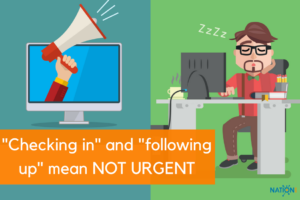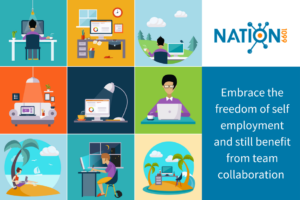Where does an independent consultant go to learn?
The inspiration for Nation1099, our new site for independent consultants and freelancers, started with questions that a group of freelance professionals had while growing their businesses.
In our mastermind sessions, over lunch and at the bar after movies, we would update one another on our search for insights and advice, and we would find ourselves wondering things like:
- What does Michael Porter’s Five Forces Analysis look like for a one-person IT consultancy?
- What does a blue ocean strategy look like for an industrial designer working on a project basis from their home office?
- How can Rita Gunther McGrath’s Discovery-Driven Growth theory help a marketing consultant grow a “portfolio of opportunities?”
If you recognize those terms, then like us you’re probably a reader of Harvard Business Review and of the latest business books. And you probably also know that the illustration of those concepts always depends on very large corporations like Nike, General Electric and Boeing. McGrath and Porter never use your neighborhood marketing consultant to illustrate their theories.
At heart we wanted to know how smart people before us did these things — if they did it — and we wanted to know what innovative people were going to do next.
But neighborhood marketing consultants and gig work in general are where all the new action is, as even HBR demonstrates with articles like “The Rise of the Supertemp.” But they just don’t publish much management or strategy advice to help someone become a supertemp.
We wanted a magazine that covered these growth concepts in-depth for marketers, graphic designers, web developers, videographers, writers and independent consultants who are working out of home offices and co-working spaces and are loosely connected with one another.
Meanwhile, because a growing number of gig professionals are also “gig native” and have never worked in agencies or consulting firms, we had other more prosaic questions:
- How do we set up our bookkeeping?
- Do we need formal contracts for the people we subcontract work to?
- What’s the right overhead target for this kind of business?
- How do we make a profit projection?
- Someone suggested I get errors and omissions insurance. Say what, now?
Is there anybody out there who has ever set up a freelance business in this way, or are we completely nuts?
At heart we wanted to know how smart people before us did these things — if they did it — and we wanted to know what innovative people were going to do next.
The missing information on the business of independent consultants

Vast literature exists on management and business development for large organizations and for small businesses. And there are many publications that help freelancers develop skills in their particular domain.
But there is no single source of information and insight for independent consultants as businesses — to teach them about management, competition, strategy and growth.
If more work is done by independents, then more independents must manage themselves like the businesses that formerly employed them. Which means we need the same kind of analysis and creative thinking brought to the independent consulting world as HBR brings to the corporate world.
I think there are five key areas most indi consultants are missing important information on. If they can better address these priorities before they take the plunge or early in their process, they can create their own unique paths to success. And I want Nation1099 to help them do just that.
The skills they need to get started

Many of us take the plunge into 1099 life because we feel stifled by the limitations of our past work experiences. We’ve honed our skills in our prior work tracts and feel ready to carve out our own paths. It’s great that we recognize our desire to change and are ready to act on it, but many of us don’t realize just how many other things we need to be ready to do like:
- Pursue our ideal clients
- Set our own freelance rates
- Put together our own consulting website
- Manage our new tax duties
- Buy health insurance
Many outlets either over-emphasize the benefits of the independent consultant life without truly preparing their readership for these challenges, or dismiss this unique career path because of these conditions, without informing readers of the very realistic ways we can handle them.
I wanted us to cover all of these topics and more in one accessible place. You’ll find detailed guides to all of these subjects and more in our Start section. If you’re curious about what it takes to become a freelance professional or are new to the independent world start here.
How independent consultants need to carry themselves with clients

Another reason many of us become independent consultants is that we got fed up working as cogs in organizations that we didn’t feel purposeful or valued in. Going solo means new found freedom and ability to self-determine.
However, many of us also come to realize that the company environments we didn’t enjoy did have some perks — for one, they guarded us from many of the stresses of direct client management like:
- Managing expectations and setting proper scopes of work
- Working out appropriate payment terms
- Handling unusual and unanticipated assignments
- Making sure we protect ourselves with the right documents
- Resolving disputes
I’ve seen so many freelancers get burned by unruly clients or a lack of preparation on their end (I’ve been on the wrong side of this before, myself), and I wanted to make sure we had a resource available that would help new independent consultants check off these boxes before getting tangled in a tricky situation. This is our Manage section.
How solopreneurs can grow their businesses

Growing a business means something fairly concrete in a standard company setting, but things aren’t quite so clear for independent consultants, and this is a problem.
Newer solos typically reach a point of frustration when they feel trapped by their own pricing. Any minute they aren’t working — they aren’t making money. This is an awful feeling and it can lead us to question our own value. We also feel stuck continuing to do lower value busy work when we really want to invest our time in growing our solo ventures.
There are no formal studies where we might learn things like:
- Finding and hiring subcontractors
- Creating a lead capture strategy
- Scaling our businesses
- Effectively following up with leads that have fallen off
- Automating our pipelines
Working solo is completely sustainable and scalable, but it takes the right strategic insights to do these things effectively, which is why we organized clear, actionable advice on these topics into our Grow section.
How they can create better lives and careers

The stresses of the office are well-documented, but how do independent professionals handle many of these same stresses without a concrete end to their work day or support from coworkers? The freelancer is burn out-prone. I know this as well as anyone, and solos need a resource that helps them:
- Cultivate their work-life balance through effective time management
- Find emotional solace and career guidance
- Determine the best work spaces for them to thrive in
- Pinpoint and address the problems holding them back
- Be more strategic with their finances and save for retirement
It’s easy to file these away as lower priority items and address them “some point in future,” but there’s a major risk involved in doing so. If we aren’t striving to work and live better each week, month and year, we won’t succeed in the long-run. We’ll hit a wall and lose our motivation.
I want freelancers to not only have the best careers they can possibly have, but also live the best lives they can. This is the big picture, and this is what our Thrive section is all about.
How independent consultants can and should help each other

More than anything else, freelancers most often overlook the help of their peers.
We’ve been told for so long that solopreneurs are “on their own” and have to depend solely on themselves. This is true in some respects, but it isn’t the whole truth. We’re still singular people and in order for us to grow our businesses, maintain a healthy outlook and even finish projects, we need help.
Collaborating with other freelancers expands your network and reach, gets you referrals, and allows you to work on higher level projects. While some freelancers may have no problems landing new client work, many of them still struggle to build the professional network they need to succeed. I’m referring to:
- Finding reliable collaborators
- Creating an effective workflow with our remote teammates
- Finding a strong support teams
- Honing professional communication skills
These are incredibly important items and in some big ways, they buck the conventional idea of independent consultants being islands unto themselves. However, I didn’t just want Nation1099 to offer advice on collaborating with other solos, I wanted us to actively facilitate the conversations.
We created our Meet The Indi series to feature freelance professionals of many different industries, backgrounds and experience levels, and learn from their successes and difficulties. We can learn so much from each other and we all benefit from participating in this flow knowledge.
Want to be featured in our next Meet The Indi? Send us an email here!
Where to go from here
We’ve organized our content on Nation1099 into five main focus areas to help you do better business and grow, no matter where you might be on your individual journey.
- Start — Everything you need to to go independent.
- Manage — Basic and advanced skills for presenting yourself like a professional.
- Grow — Entrepreneurial strategies for taking your solo business to the next level.
- Thrive — Jobs are for working, but gigging is for living. Tips for making sure your business works for you.
- Connect — Plugging into the solopreneur’s secret weapon . . . the growing network of fellow freelancers.
- Meet The Indi – Informative and inspirational interviews from your fellow freelancers and independent consultants.
Is there a specific topic you want to see us cover — or do you have an idea for a piece you want to see on here? Tell us below. More than anything, we want this website to be an approachable resource everyone feels welcome to engage with and contribute to. Let’s get started.

Robert McGuire
Publisher of Nation1099
Robert McGuire is the owner of McGuire Editorial, a content marketing services firm specializing in B2B and tech startups.










